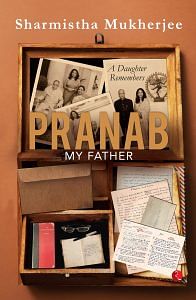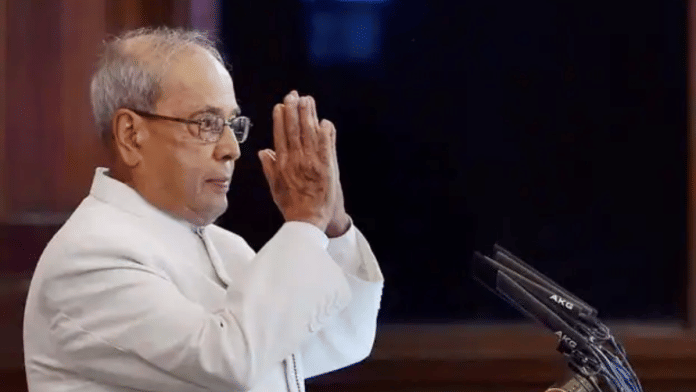Pranab’s thick Bengali-accented English was the butt of jokes in Lutyens’ Delhi. The city’s public-school-educated elites found the accent hilarious. Perhaps, they were also perplexed at the rapid rise of a short, quintessential Bengali ‘bhadralok’ in the power corridors of the capital. Even his mentor, Indira Gandhi, mentioned it to him a few times during the early days of their interaction. ‘Pranab, why don’t you keep a tutor? That will do you a world of good,’ she would say. After hearing this a few times, Pranab got a bit irritated and said, ‘Madam, you can’t square the circle. I am who I am. You have to tolerate it.’
As the future unfolded, it was obvious that Indira not only tolerated but came to value the man whose political acumen, administrative skills, quick grasp of difficult issues, aptitude for solving tricky problems and strong sense of loyalty to her far outweighed any deficiency in his English. Perhaps, she even appreciated his stodgy determination to hold on to his roots despite his meteoric rise in the highvoltage power circuit of national politics.
Pranab came to Indira’s notice during his second speech in Parliament regarding the nationalization of banks. He was one of the junior-most members of the Rajya Sabha. As per House rules, the total time allotted to a party for speaking is as per the strength of members of the party within the House. As there were only two members from the Bangla Congress in the Rajya Sabha, Pranab was given only three minutes to speak, and that too pretty late in the evening. However, he managed to speak for nearly 20 minutes without interruption, and the chairperson did not object. As luck would have it, Indira walked into the House just before his speech, followed by a large number of Congress MPs. So, Pranab not only had a full house but also the PM listening to his speech.
After the speech, Indira asked Om Mehta, the then chief whip of the Congress in the Rajya Sabha, about the ‘boy’. After the House was adjourned, Bhupesh Gupta, Indira’s close friend, introduced Pranab to her. In her speech in Parliament the following day, Indira mentioned Pranab’s speech.
As Pranab’s political journey progressed, he became increasingly involved in significant legislative matters, including the Privy Purse Bill, which aimed to abolish princely privileges. His dedication to these issues showcased his commitment to the Congress party and its leadership.
Also read: Feroze wanted to divorce Indira Gandhi & marry another woman. Nehru put his foot down
A few days later, Pranab received a call from the Prime Minister’s Office (PMO) to meet the PM. At that time, another landmark bill, the Privy Purse Bill to abolish the constitutional provision guaranteeing privy purses and princely privileges, was about to be introduced in the Lok Sabha. In the meeting, Indira asked Pranab about the Bangla Congress’ stand on the Bill. Pranab assured her that his party would support the Bill. Indira then asked him to find out about the Lok Sabha MP from Bangla Congress, Sardar Amjad Ali. She said that she had received information about Amjad Ali hobnobbing with the representatives of the erstwhile princely states, who were naturally against the Bill and were regular visitors to Amjad’s house. Indira requested Pranab to speak to him to ascertain his position and ensure his support. Pranab assured her that he would do the needful.
Amjad Ali was Pranab’s close friend. When Pranab asked him about these royal visits, Amjad’s response was quite candid. He said, ‘Brother, we belong to an ordinary middle-class family. Never in my life I thought that I would get a chance to fraternize with royalty whose ancestors I read about in history books. They come to my humble house in their big limousines to try to enlist my support. Let me feel important, though temporarily, but don’t worry, I will support the Bill.’ And he did!
Incidentally, when the Bill was presented for the first time in 1970, it was passed in the Lok Sabha but failed to get the required two-thirds majority (a requirement for any Constitutional Amendment) in the Rajya Sabha by just one vote. It was finally passed in both the houses in 1971 and Privy Purse was abolished through the 26th Constitutional Amendment. That same year, Bangla Congress merged with the Indian National Congress.
In 1972, Pranab was made a member of the Congress Parliamentary Party (CPP).
Since then, Indira kept an eye on the ‘boy’ who was longing to participate in every debate, whenever given a chance. He would attend Parliament every day during the sessions, with the utter devotion and discipline of a studious school boy. By Pranab’s own admission, he never missed Parliament for a single day except when he had to travel outside Delhi for some official errand. Indira once joked that perhaps Pranab was given the duty of cleaning the House literally, not metaphorically, as he was always the first to arrive and last to leave.
 This excerpt from Sharmistha Mukherjee’s ‘Pranab: My Father’ has been published with permission from Rupa Publications.
This excerpt from Sharmistha Mukherjee’s ‘Pranab: My Father’ has been published with permission from Rupa Publications.






